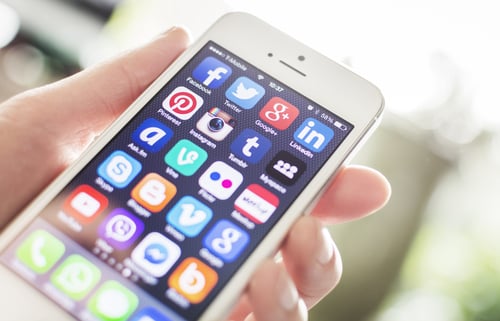Using Social Media to Better Our Mental Health

They say you are what you eat, and while this famous line can be argued, if you think about it fundamentally, you really are. Whatever you eat, you literally put in your body. For example, if I eat a piece of cake, the cake is now a part of me. I contain the flour, sugar, eggs and other items that make the delicious cake what it is. I have ingested those ingredients and will process and digest them. Why are we talking about cake? Because believe it or not, our social media use follows the same process. We use our energy to process and digest the information we scroll through, except, in this case, it's the mind doing the work instead of the gut. How does this become a problem? We release the food, but we can't necessarily release the triggers and messages we receive from online scrolling. Eating the cake is a temporary experience, but the messages and videos from the internet can stay with us for a lifetime.
Think about each meme, each tweet, and each video as a piece of cake. Every time we scroll, read and react, we are eating those images and digesting them. Ask yourself: what types of things am I ingesting, and are they good for me? Are you watching videos that promote emotional well being and read memes that make you smile? Or are you filling your online appetite with violent images, dark humor, and self-deprecating junk? It's time for us to realize that just like food, we are what we see.
Positive Ways to Use Social Media
People think social media use is implicitly negative, but there are many positive aspects to the platforms. We just have to look for them. There are social justice warriors on Instagram inspiring the world, there are up-and-coming politicians spreading change through Twitter, and there are mental health advocates all over YouTube waiting to help you change your life and find your path to happiness. You can learn a new hobby through online tutorials, take free classes, and even learn another language from the comfort of your own home. But if we aren't watching those specific videos, if we don't choose the route that will help us grow, we limit our potential and continue down the path of suffering. Where to start? It's time to go on a social media diet. Cut out anything that is emotionally triggering, which leaves you feeling sad, and makes you think less of yourself. The best piece of advice? Start with anything that makes you compare. A comparative culture is easy to fall into online. This happens when we see others looking a certain way or living a certain lifestyle, and we immediately compare our lives to theirs. Do these statements sound familiar? That person's body is better than mine. I'm fat. I'm so ugly. They have way more money than I do. I'll never make that much. I'll never be that good at (fill in the blank) skill. I'm not talented. My life sucks after seeing how (that person) lives. They have a good relationship with their parents. I don't Everyone is happier than me. I'll never be that happy. They look so happy together. I'm going to be alone forever. These statements may seem harmless at first. We may not even believe them but think about the cake. The more we ingest, the more ingredients we add to our mind and heart. If we continue to compare, the more we tell ourselves, I'm just not good enough. And if we continue to repeat those comparative mantras, we begin to believe them. They will become a piece of us, just like the flour, and sugar, and eggs.The Other Side of Comparative Culture
Here's the silver lining—none of this is actually true. All these mantras, comparisons, and ingredients are literally all in your head. It may feel difficult to understand, but this negative self-talk is easier to correct than you may think. Instead of feeding yourself negative messages, rewrite the narrative, and fill your feed with daily gratitude, pictures that inspire, and joke memes that bring you into a place of peace and acceptance. It may take some time, but it's worth the effort. If you struggle with an eating disorder, following body positive accounts and ED survivors that are working hard to stay healthy and happy can motivate you to do the same and remind you that you're not alone. If you struggle with drug or alcohol addiction, follow sober/clean accounts that promote a substance-free lifestyle. If you've struggled or are struggling with mental health issues, look for accounts with people that are fighting the same battle who offer advice, inspiration, and community. Find the accounts that can help you instead of enabling you to make negative choices that could lead to dire consequences. Just like any addiction, it may take some time to remap our brains, but if we stay with it, if we refuse to indulge in the negative, we will begin to see small changes in our mindset that will spark a new life of freedom and joy.Addictions can come in all forms, and just because you are functional, doesn't mean you're living your best life in health and happiness. Reach out to Stonewater Adolescent Recovery Center today and learn about the dangers of online gaming and other ways addiction can manifest. If you or someone you know is struggling with an addiction, call (662) 478-9463 today to win your life back and become the inspiration you are currently seeking.

.jpg)

